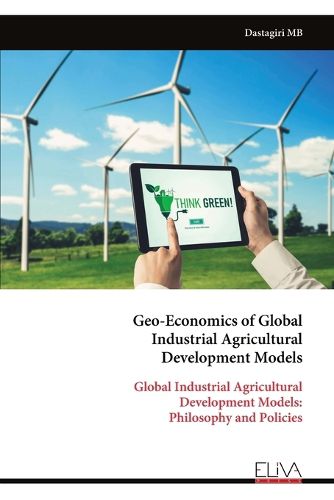Readings Newsletter
Become a Readings Member to make your shopping experience even easier.
Sign in or sign up for free!
You’re not far away from qualifying for FREE standard shipping within Australia
You’ve qualified for FREE standard shipping within Australia
The cart is loading…






This title is printed to order. This book may have been self-published. If so, we cannot guarantee the quality of the content. In the main most books will have gone through the editing process however some may not. We therefore suggest that you be aware of this before ordering this book. If in doubt check either the author or publisher’s details as we are unable to accept any returns unless they are faulty. Please contact us if you have any questions.
The global nature of the agricultural industry has seen substantial modifications as a result of industrialization and commercialization. Since its inception in the mid-20th century, industrial agriculture has been promoted to the public as a technological marvel. Its philosophy is its efficiency would enable food production and its economies of scale would ensure profitable farming. The present paper analyzes the global countries, UNO, World Bank, IMF, WTO, and MNCs, TNCs, philanthropic corporate industrial agricultural models and their nature and suggests policies for profitable models for the globe. The results of global countries models show that USA-Industrial Agricultural, Canada-Value-added Production Industrial Agriculture, Mexico- Commercial Agriculture, Brazil- Integrated Farming an Low Carbon Farming, UK- Mechanized & Industrial agriculture models, Germany- Smart Farming, Switzerland-Organic Farming, Russia-Market oriented models, Sweden-Modern farming models, Australia-Conservation Farming, India-IFS Model, China Intensive farming Models, South Africa- Dual agriculture economy, MNC's TNC's-Global Corporate Farming Models. World Bank: Global markets via value-chains originating in industrial agriculture, IMF: International partnership for sustainable development, WTO: ""global partnership"" Model, UNO: inclusive business models in Agriculture and Food systems for sustainability, UN ESCAP and Billgate: inclusive business models partnership in Sub-Saharan Africa and Southeast Asia. The study suggests adopting Russian contract farming, joint venture, corporate models which minimize the resource constraints, advanced technologies adoption, and linking global supply chains for small farms in Asia and Africa. IMF and World Bank are practiced cooperation, WTO to include cooperation with the UN system, OECD, and other international partners. MNC's TNC's- Global Corporate Farming Models, transparency, accountability crucial to ensure responsible corporate behavior.
$9.00 standard shipping within Australia
FREE standard shipping within Australia for orders over $100.00
Express & International shipping calculated at checkout
This title is printed to order. This book may have been self-published. If so, we cannot guarantee the quality of the content. In the main most books will have gone through the editing process however some may not. We therefore suggest that you be aware of this before ordering this book. If in doubt check either the author or publisher’s details as we are unable to accept any returns unless they are faulty. Please contact us if you have any questions.
The global nature of the agricultural industry has seen substantial modifications as a result of industrialization and commercialization. Since its inception in the mid-20th century, industrial agriculture has been promoted to the public as a technological marvel. Its philosophy is its efficiency would enable food production and its economies of scale would ensure profitable farming. The present paper analyzes the global countries, UNO, World Bank, IMF, WTO, and MNCs, TNCs, philanthropic corporate industrial agricultural models and their nature and suggests policies for profitable models for the globe. The results of global countries models show that USA-Industrial Agricultural, Canada-Value-added Production Industrial Agriculture, Mexico- Commercial Agriculture, Brazil- Integrated Farming an Low Carbon Farming, UK- Mechanized & Industrial agriculture models, Germany- Smart Farming, Switzerland-Organic Farming, Russia-Market oriented models, Sweden-Modern farming models, Australia-Conservation Farming, India-IFS Model, China Intensive farming Models, South Africa- Dual agriculture economy, MNC's TNC's-Global Corporate Farming Models. World Bank: Global markets via value-chains originating in industrial agriculture, IMF: International partnership for sustainable development, WTO: ""global partnership"" Model, UNO: inclusive business models in Agriculture and Food systems for sustainability, UN ESCAP and Billgate: inclusive business models partnership in Sub-Saharan Africa and Southeast Asia. The study suggests adopting Russian contract farming, joint venture, corporate models which minimize the resource constraints, advanced technologies adoption, and linking global supply chains for small farms in Asia and Africa. IMF and World Bank are practiced cooperation, WTO to include cooperation with the UN system, OECD, and other international partners. MNC's TNC's- Global Corporate Farming Models, transparency, accountability crucial to ensure responsible corporate behavior.